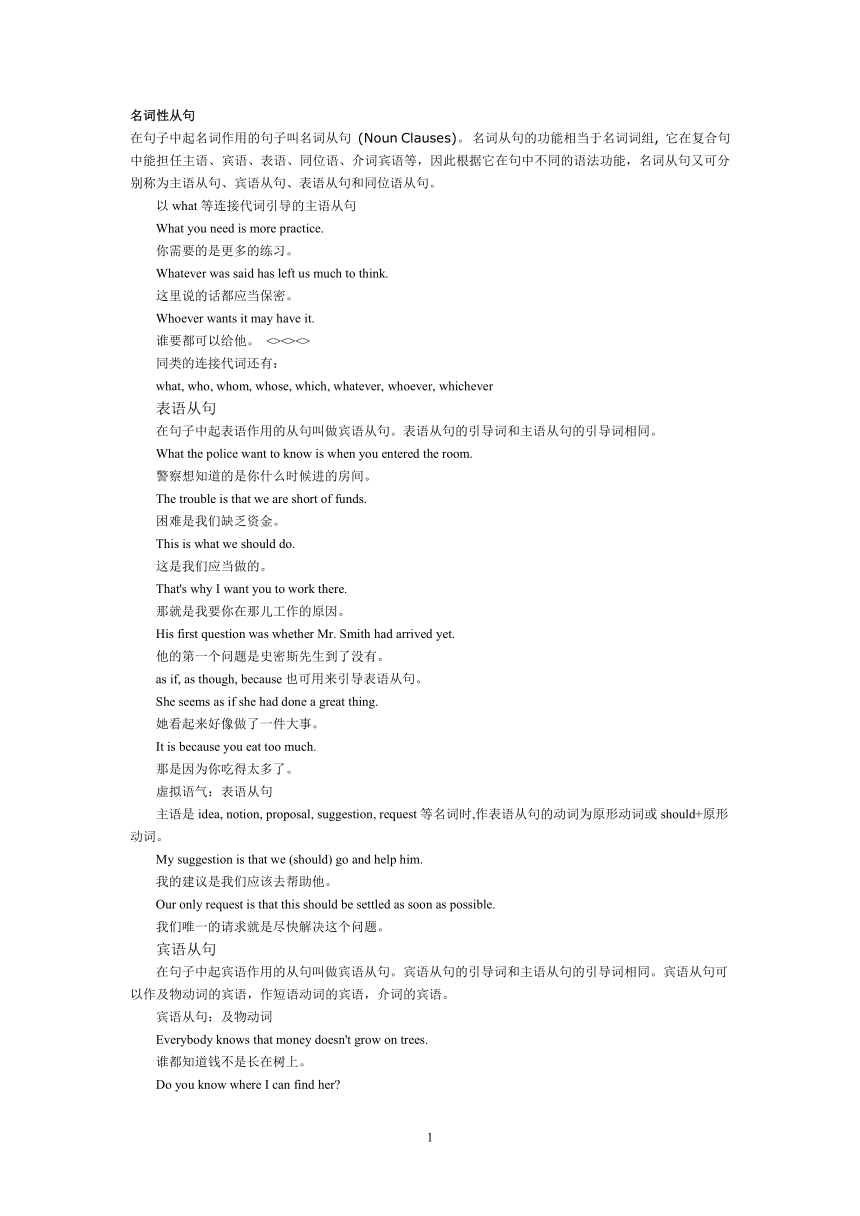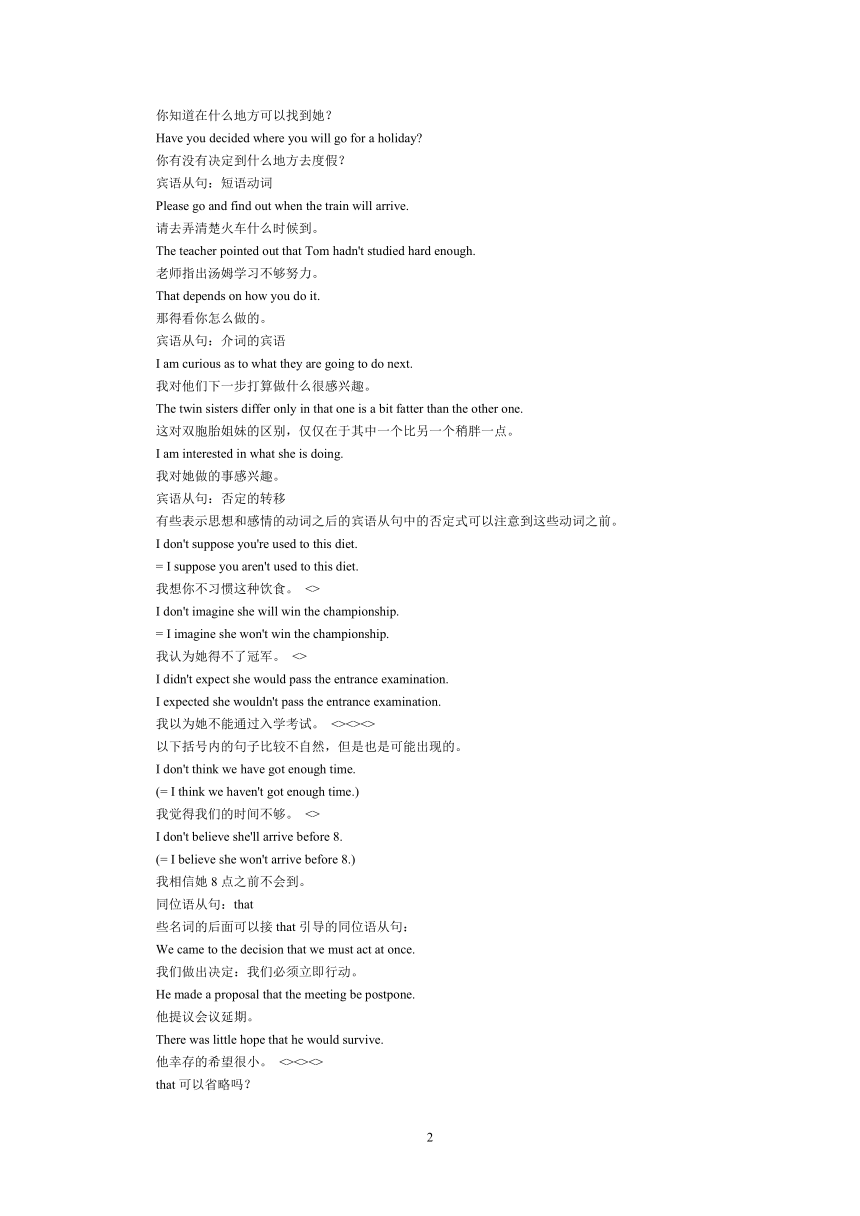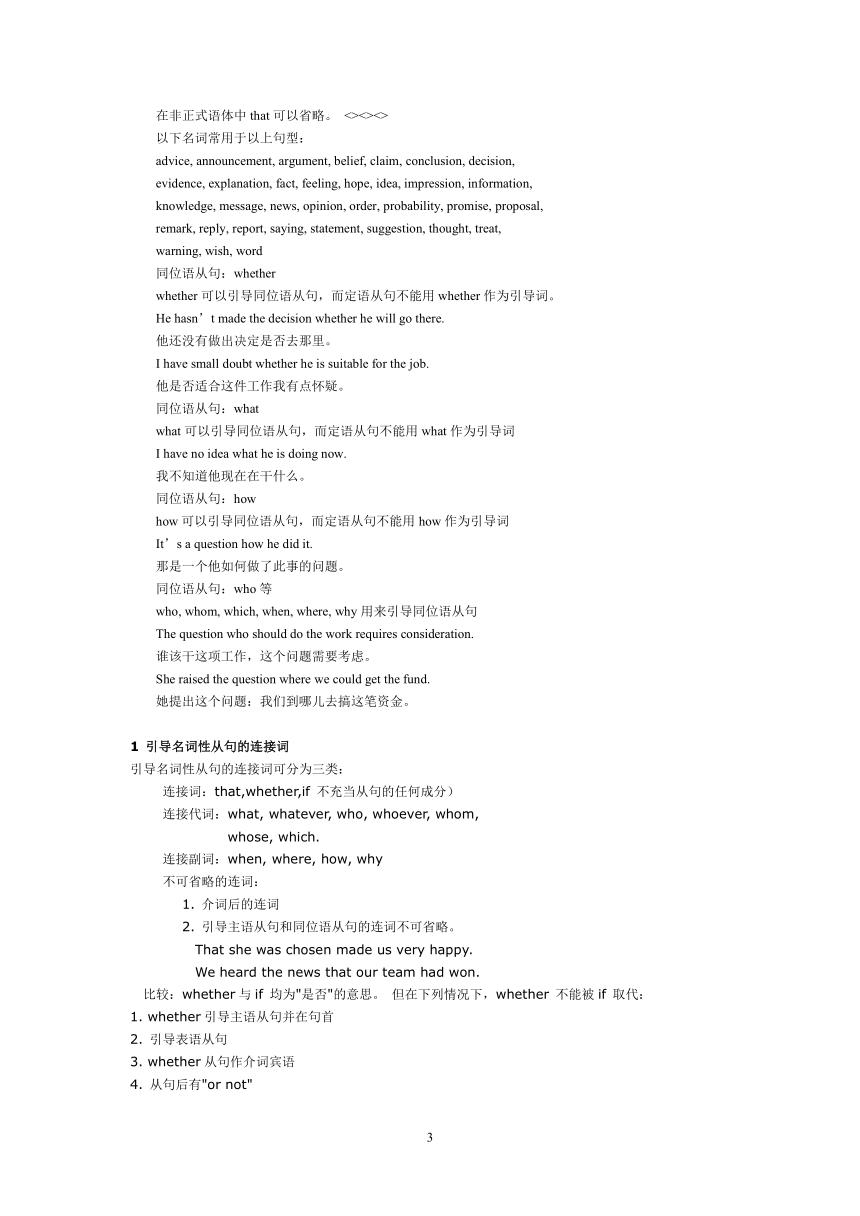名词性从句[上学期]
图片预览



文档简介
名词性从句
在句子中起名词作用的句子叫名词从句 (Noun Clauses)。 名词从句的功能相当于名词词组, 它在复合句中能担任主语、宾语、表语、同位语、介词宾语等,因此根据它在句中不同的语法功能,名词从句又可分别称为主语从句、宾语从句、表语从句和同位语从句。
以what等连接代词引导的主语从句
What you need is more practice.
你需要的是更多的练习。
Whatever was said has left us much to think.
这里说的话都应当保密。
Whoever wants it may have it.
谁要都可以给他。 <><><>
同类的连接代词还有:
what, who, whom, whose, which, whatever, whoever, whichever
表语从句
在句子中起表语作用的从句叫做宾语从句。表语从句的引导词和主语从句的引导词相同。
What the police want to know is when you entered the room.
警察想知道的是你什么时候进的房间。
The trouble is that we are short of funds.
困难是我们缺乏资金。
This is what we should do.
这是我们应当做的。
That's why I want you to work there.
那就是我要你在那儿工作的原因。
His first question was whether Mr. Smith had arrived yet.
他的第一个问题是史密斯先生到了没有。
as if, as though, because也可用来引导表语从句。
She seems as if she had done a great thing.
她看起来好像做了一件大事。
It is because you eat too much.
那是因为你吃得太多了。
虚拟语气:表语从句
主语是idea, notion, proposal, suggestion, request等名词时,作表语从句的动词为原形动词或should+原形动词。
My suggestion is that we (should) go and help him.
我的建议是我们应该去帮助他。
Our only request is that this should be settled as soon as possible.
我们唯一的请求就是尽快解决这个问题。
宾语从句
在句子中起宾语作用的从句叫做宾语从句。宾语从句的引导词和主语从句的引导词相同。宾语从句可以作及物动词的宾语,作短语动词的宾语,介词的宾语。
宾语从句:及物动词
Everybody knows that money doesn't grow on trees.
谁都知道钱不是长在树上。
Do you know where I can find her
你知道在什么地方可以找到她?
Have you decided where you will go for a holiday
你有没有决定到什么地方去度假?
宾语从句:短语动词
Please go and find out when the train will arrive.
请去弄清楚火车什么时候到。
The teacher pointed out that Tom hadn't studied hard enough.
老师指出汤姆学习不够努力。
That depends on how you do it.
那得看你怎么做的。
宾语从句:介词的宾语
I am curious as to what they are going to do next.
我对他们下一步打算做什么很感兴趣。
The twin sisters differ only in that one is a bit fatter than the other one.
这对双胞胎姐妹的区别,仅仅在于其中一个比另一个稍胖一点。
I am interested in what she is doing.
我对她做的事感兴趣。
宾语从句:否定的转移
有些表示思想和感情的动词之后的宾语从句中的否定式可以注意到这些动词之前。
I don't suppose you're used to this diet.
= I suppose you aren't used to this diet.
我想你不习惯这种饮食。 <>
I don't imagine she will win the championship.
= I imagine she won't win the championship.
我认为她得不了冠军。 <>
I didn't expect she would pass the entrance examination.
I expected she wouldn't pass the entrance examination.
我以为她不能通过入学考试。 <><><>
以下括号内的句子比较不自然,但是也是可能出现的。
I don't think we have got enough time.
(= I think we haven't got enough time.)
我觉得我们的时间不够。 <>
I don't believe she'll arrive before 8.
(= I believe she won't arrive before 8.)
我相信她8点之前不会到。
同位语从句:that
些名词的后面可以接that引导的同位语从句:
We came to the decision that we must act at once.
我们做出决定:我们必须立即行动。
He made a proposal that the meeting be postpone.
他提议会议延期。
There was little hope that he would survive.
他幸存的希望很小。 <><><>
that可以省略吗?
在非正式语体中that可以省略。 <><><>
以下名词常用于以上句型:
advice, announcement, argument, belief, claim, conclusion, decision,
evidence, explanation, fact, feeling, hope, idea, impression, information,
knowledge, message, news, opinion, order, probability, promise, proposal,
remark, reply, report, saying, statement, suggestion, thought, treat,
warning, wish, word
同位语从句:whether
whether可以引导同位语从句,而定语从句不能用whether作为引导词。
He hasn’t made the decision whether he will go there.
他还没有做出决定是否去那里。
I have small doubt whether he is suitable for the job.
他是否适合这件工作我有点怀疑。
同位语从句:what
what可以引导同位语从句,而定语从句不能用what作为引导词
I have no idea what he is doing now.
我不知道他现在在干什么。
同位语从句:how
how可以引导同位语从句,而定语从句不能用how作为引导词
It’s a question how he did it.
那是一个他如何做了此事的问题。
同位语从句:who等
who, whom, which, when, where, why用来引导同位语从句
The question who should do the work requires consideration.
谁该干这项工作,这个问题需要考虑。
She raised the question where we could get the fund.
她提出这个问题:我们到哪儿去搞这笔资金。
1 引导名词性从句的连接词
引导名词性从句的连接词可分为三类:
连接词:that,whether,if 不充当从句的任何成分)
连接代词:what, whatever, who, whoever, whom,
whose, which.
连接副词:when, where, how, why
不可省略的连词:
1. 介词后的连词
2. 引导主语从句和同位语从句的连词不可省略。
That she was chosen made us very happy.
We heard the news that our team had won.
比较:whether与if 均为"是否"的意思。 但在下列情况下,whether 不能被if 取代:
1. whether引导主语从句并在句首
2. 引导表语从句
3. whether从句作介词宾语
4. 从句后有"or not"
Whether he will come is not clear.
大部分连接词引导的主语从句都可以置于句末,用 it充当形式主语。
It is not important who will go.
It is still unknown which team will win the match.
2 名词性that-从句
1)由从属连词that引导的从句叫做名词性that-从句。 That只起连接主句和从句的作用,在从句中不担任任何成分,本身也没有词义。名词性that-从句在句中能充当主 语、宾语、表语、同位语和形容词宾语,例如:
主语:That he is still alive is sheer luck. 他还活着全靠运气。
宾语:John said that he was leaving for London on Wednesday. 约翰说他星期三要到伦敦去。
表语:The fact is that he has not been seen recently. 事实是近来谁也没有见过他。
同位语:The fact that he has not been seen recently disturbs everyone in his office.
近来谁也没有见过他,这一事实令办公室所有的人不安。
形容词宾语:I am glad that you are satisfied with your job.
你对工作满意我感到很高兴。
2)That-从句作主语通常用it作先行词,而将that-从句置于句末,例如:
It is quite clear that the whole project is doomed to failure. 很清楚,整个计划注定要失败。
It's a pity that you should have to leave. 你非走不可真是件憾事。
用it作形式主语的that-从句有以下四种不同的搭配关系:
a. It + be +形容词+ that-从句
It is necessary that… 有必要……
It is important that… 重要的是……
It is obvious that… 很明显……
b. It + be + -ed 分词+ that-从句
It is believed that… 人们相信……
It is known to all that… 从所周知……
It has been decided that… 已决定……
c. It + be +名词+ that-从句
It is common knowledge that… ……是常识
It is a surprise that… 令人惊奇的是……
It is a fact that… 事实是……
d. It +不及物动词+ that-分句
It appears that… 似乎……
It happens that… 碰巧……
It occurred to me that… 我突然想起……
3 名词性wh-从句
1)由wh-词引导的名词从句叫做名词性wh-从句。Wh-词包括who, whom,. whose, whoever, what, whatever, which, whichever等连接代词和where, when, how, why等连接副词。Wh-从句的语法功能除了和that-从句一样外,还可充当介词宾语、宾语补语和间接宾语等,例如:
主语: How the book will sell depends on its author. 书销售如何取决于作者本人。
直接宾语:In one's own home one can do what one likes. 在自己家里可以随心所欲。
间接宾语:The club will give whoever wins a prize.
俱乐部将给得胜者设奖。
表语: My question is who will take over president of the Foundation. 我的问题是谁将接任该基金会主席职位。
宾语补足语:She will name him whatever she wants to. 她高兴给他起什么名字就取什么名字。
同位语: I have no idea when he will return.
我不知道他什么时候回来。
形容词宾语:I'm not sure why she refused their invitation. 我尚不能肯定她为什么拒绝他们的邀请。
介词宾语: That depends on where we shall go.
那取决于我们去哪儿。
2)Wh-从句作主语也常用先行词it做形式主语,而将wh-从句置于句末,例如:
It is not yet decided who will do that job.
还没决定谁做这项工作。
It remains unknown when they are going to get married. 他们何时结婚依然不明。
4 if, whether引导的名词从句
1)yes-no型疑问从句
从属连词if, whether引导的名词从句是由一般疑问句或选择疑问转化而来的,因此也分别被称为yes-no型疑问句从句和选择型疑问从句,其功能和wh-从句的功能相同, 例如:
主语:Whether the plan is feasible remains to be proved. 这一计划是否可行还有等证实。
宾语:Let us know whether / if you can finish the article before Friday. 请让我们知道你是否能在星期五以前把文章写完。
表语:The point is whether we should lend him the money. 问题在于我们是否应该借钱给他。
同位语:They are investigating the question whether the man is trustworthy. 他们调查他是否值得信赖。
形容词宾语: She's doubtful whether we shall be able to come. 她怀疑我们是否能够前来。
介词宾语: I worry about whether he can pass through the crisis of his illness. 我担心他是否能度过疾病的危险期。
关联词只能用whether不能用if表示“是否”的情况如下:
A)在表语从句和同位语从句中。例如:
The question is whether the film is worth seeing.
The news whether our team has won the match is unknown.
B)在主语从句中,只有用it作形式主语时,whether和if都能引导主语从句,否则,
也只能用whether。例如:
Whether we shall attend the meeting hasn’t been decided yet.
It hasn’t been decided whether(if)we shall attend the meeting.
C)在介词之后。(介词往往可以省略)例如:
It all depends (on) whether they will support us.
D)后面直接跟动词不定式时。
He doesn’t know whether to stay or not.
E)后面紧接or not 时。
We didn’t know whether or not she was ready.
F)引导让步状语从句,只能用whether。
Whether you like it or not, you must do it well.
G)用if会引起歧义时。例如:Please let me know if you like it.
该句有两个意思:“请告诉我你是否喜欢”。
或“如果你喜欢,请告诉我。”用了whether就可以避免。
2)选择性疑问从句
选择性疑问从句由关联词if/whether…or或whethe…or not构成,例如:
Please tell me whether / if they are Swedish or Danish. 请告诉我他们是瑞典人还是丹麦人。
I don't care whether you like the plan or not.我不在乎你是否喜欢该计划。
5 否定转移
1) 将think, believe, suppose, expect, fancy, imagine等动词后面宾语从句的否定词转移到主句中,即主句的谓语动词用否定式,而从句的谓语动词用肯定式。
I don't think I know you. 我想我并不认识你。
I don' t believe he will come. 我相信他不回来。
注意:若谓语动词为hope,宾语从句中的否定词不能转移。
I hope you weren't ill. 我想你没有生病吧。
2) 将seem, appear 等后的从句的否定转移到前面。
It doesn't seem that they know where to go.
看来他们不知道往哪去。
It doesn't appear that we'll have a sunny day tomorrow.
看来我们明天不会碰上好天气。
3) 有时将动名词,介词短语或整个从句的否定转变为对谓语动词的否定。
I don't remember having ever seen such a man.
我记得从未见过这样一个人。 (not否定动名词短语 having…)
It's not a place where anyone would expect to see strange characters on the street.
在这里,人们不会想到在街上会碰上陌生的人。
(anyone 作主语,从句中的谓语动词不能用否定形式。)
4) 有时状语或状语从句中否定可以转移到谓语动词前。
The ant is not gathering this for itself alone. (否定状语) 蚂蚁不只是为自己采食。
He was not ready to believe something just because Aristotle said so. (否定because状语) 他并不因亚里斯多德说过如何如何,就轻信此事。
She had not been married many weeks when that man's younger brother saw her and was struck by her beauty. (否定状语many weeks) 她结婚还不到几个月,这个人的弟弟就看见她了,并对她的美貌着了迷。
PAGE
6
在句子中起名词作用的句子叫名词从句 (Noun Clauses)。 名词从句的功能相当于名词词组, 它在复合句中能担任主语、宾语、表语、同位语、介词宾语等,因此根据它在句中不同的语法功能,名词从句又可分别称为主语从句、宾语从句、表语从句和同位语从句。
以what等连接代词引导的主语从句
What you need is more practice.
你需要的是更多的练习。
Whatever was said has left us much to think.
这里说的话都应当保密。
Whoever wants it may have it.
谁要都可以给他。 <><><>
同类的连接代词还有:
what, who, whom, whose, which, whatever, whoever, whichever
表语从句
在句子中起表语作用的从句叫做宾语从句。表语从句的引导词和主语从句的引导词相同。
What the police want to know is when you entered the room.
警察想知道的是你什么时候进的房间。
The trouble is that we are short of funds.
困难是我们缺乏资金。
This is what we should do.
这是我们应当做的。
That's why I want you to work there.
那就是我要你在那儿工作的原因。
His first question was whether Mr. Smith had arrived yet.
他的第一个问题是史密斯先生到了没有。
as if, as though, because也可用来引导表语从句。
She seems as if she had done a great thing.
她看起来好像做了一件大事。
It is because you eat too much.
那是因为你吃得太多了。
虚拟语气:表语从句
主语是idea, notion, proposal, suggestion, request等名词时,作表语从句的动词为原形动词或should+原形动词。
My suggestion is that we (should) go and help him.
我的建议是我们应该去帮助他。
Our only request is that this should be settled as soon as possible.
我们唯一的请求就是尽快解决这个问题。
宾语从句
在句子中起宾语作用的从句叫做宾语从句。宾语从句的引导词和主语从句的引导词相同。宾语从句可以作及物动词的宾语,作短语动词的宾语,介词的宾语。
宾语从句:及物动词
Everybody knows that money doesn't grow on trees.
谁都知道钱不是长在树上。
Do you know where I can find her
你知道在什么地方可以找到她?
Have you decided where you will go for a holiday
你有没有决定到什么地方去度假?
宾语从句:短语动词
Please go and find out when the train will arrive.
请去弄清楚火车什么时候到。
The teacher pointed out that Tom hadn't studied hard enough.
老师指出汤姆学习不够努力。
That depends on how you do it.
那得看你怎么做的。
宾语从句:介词的宾语
I am curious as to what they are going to do next.
我对他们下一步打算做什么很感兴趣。
The twin sisters differ only in that one is a bit fatter than the other one.
这对双胞胎姐妹的区别,仅仅在于其中一个比另一个稍胖一点。
I am interested in what she is doing.
我对她做的事感兴趣。
宾语从句:否定的转移
有些表示思想和感情的动词之后的宾语从句中的否定式可以注意到这些动词之前。
I don't suppose you're used to this diet.
= I suppose you aren't used to this diet.
我想你不习惯这种饮食。 <>
I don't imagine she will win the championship.
= I imagine she won't win the championship.
我认为她得不了冠军。 <>
I didn't expect she would pass the entrance examination.
I expected she wouldn't pass the entrance examination.
我以为她不能通过入学考试。 <><><>
以下括号内的句子比较不自然,但是也是可能出现的。
I don't think we have got enough time.
(= I think we haven't got enough time.)
我觉得我们的时间不够。 <>
I don't believe she'll arrive before 8.
(= I believe she won't arrive before 8.)
我相信她8点之前不会到。
同位语从句:that
些名词的后面可以接that引导的同位语从句:
We came to the decision that we must act at once.
我们做出决定:我们必须立即行动。
He made a proposal that the meeting be postpone.
他提议会议延期。
There was little hope that he would survive.
他幸存的希望很小。 <><><>
that可以省略吗?
在非正式语体中that可以省略。 <><><>
以下名词常用于以上句型:
advice, announcement, argument, belief, claim, conclusion, decision,
evidence, explanation, fact, feeling, hope, idea, impression, information,
knowledge, message, news, opinion, order, probability, promise, proposal,
remark, reply, report, saying, statement, suggestion, thought, treat,
warning, wish, word
同位语从句:whether
whether可以引导同位语从句,而定语从句不能用whether作为引导词。
He hasn’t made the decision whether he will go there.
他还没有做出决定是否去那里。
I have small doubt whether he is suitable for the job.
他是否适合这件工作我有点怀疑。
同位语从句:what
what可以引导同位语从句,而定语从句不能用what作为引导词
I have no idea what he is doing now.
我不知道他现在在干什么。
同位语从句:how
how可以引导同位语从句,而定语从句不能用how作为引导词
It’s a question how he did it.
那是一个他如何做了此事的问题。
同位语从句:who等
who, whom, which, when, where, why用来引导同位语从句
The question who should do the work requires consideration.
谁该干这项工作,这个问题需要考虑。
She raised the question where we could get the fund.
她提出这个问题:我们到哪儿去搞这笔资金。
1 引导名词性从句的连接词
引导名词性从句的连接词可分为三类:
连接词:that,whether,if 不充当从句的任何成分)
连接代词:what, whatever, who, whoever, whom,
whose, which.
连接副词:when, where, how, why
不可省略的连词:
1. 介词后的连词
2. 引导主语从句和同位语从句的连词不可省略。
That she was chosen made us very happy.
We heard the news that our team had won.
比较:whether与if 均为"是否"的意思。 但在下列情况下,whether 不能被if 取代:
1. whether引导主语从句并在句首
2. 引导表语从句
3. whether从句作介词宾语
4. 从句后有"or not"
Whether he will come is not clear.
大部分连接词引导的主语从句都可以置于句末,用 it充当形式主语。
It is not important who will go.
It is still unknown which team will win the match.
2 名词性that-从句
1)由从属连词that引导的从句叫做名词性that-从句。 That只起连接主句和从句的作用,在从句中不担任任何成分,本身也没有词义。名词性that-从句在句中能充当主 语、宾语、表语、同位语和形容词宾语,例如:
主语:That he is still alive is sheer luck. 他还活着全靠运气。
宾语:John said that he was leaving for London on Wednesday. 约翰说他星期三要到伦敦去。
表语:The fact is that he has not been seen recently. 事实是近来谁也没有见过他。
同位语:The fact that he has not been seen recently disturbs everyone in his office.
近来谁也没有见过他,这一事实令办公室所有的人不安。
形容词宾语:I am glad that you are satisfied with your job.
你对工作满意我感到很高兴。
2)That-从句作主语通常用it作先行词,而将that-从句置于句末,例如:
It is quite clear that the whole project is doomed to failure. 很清楚,整个计划注定要失败。
It's a pity that you should have to leave. 你非走不可真是件憾事。
用it作形式主语的that-从句有以下四种不同的搭配关系:
a. It + be +形容词+ that-从句
It is necessary that… 有必要……
It is important that… 重要的是……
It is obvious that… 很明显……
b. It + be + -ed 分词+ that-从句
It is believed that… 人们相信……
It is known to all that… 从所周知……
It has been decided that… 已决定……
c. It + be +名词+ that-从句
It is common knowledge that… ……是常识
It is a surprise that… 令人惊奇的是……
It is a fact that… 事实是……
d. It +不及物动词+ that-分句
It appears that… 似乎……
It happens that… 碰巧……
It occurred to me that… 我突然想起……
3 名词性wh-从句
1)由wh-词引导的名词从句叫做名词性wh-从句。Wh-词包括who, whom,. whose, whoever, what, whatever, which, whichever等连接代词和where, when, how, why等连接副词。Wh-从句的语法功能除了和that-从句一样外,还可充当介词宾语、宾语补语和间接宾语等,例如:
主语: How the book will sell depends on its author. 书销售如何取决于作者本人。
直接宾语:In one's own home one can do what one likes. 在自己家里可以随心所欲。
间接宾语:The club will give whoever wins a prize.
俱乐部将给得胜者设奖。
表语: My question is who will take over president of the Foundation. 我的问题是谁将接任该基金会主席职位。
宾语补足语:She will name him whatever she wants to. 她高兴给他起什么名字就取什么名字。
同位语: I have no idea when he will return.
我不知道他什么时候回来。
形容词宾语:I'm not sure why she refused their invitation. 我尚不能肯定她为什么拒绝他们的邀请。
介词宾语: That depends on where we shall go.
那取决于我们去哪儿。
2)Wh-从句作主语也常用先行词it做形式主语,而将wh-从句置于句末,例如:
It is not yet decided who will do that job.
还没决定谁做这项工作。
It remains unknown when they are going to get married. 他们何时结婚依然不明。
4 if, whether引导的名词从句
1)yes-no型疑问从句
从属连词if, whether引导的名词从句是由一般疑问句或选择疑问转化而来的,因此也分别被称为yes-no型疑问句从句和选择型疑问从句,其功能和wh-从句的功能相同, 例如:
主语:Whether the plan is feasible remains to be proved. 这一计划是否可行还有等证实。
宾语:Let us know whether / if you can finish the article before Friday. 请让我们知道你是否能在星期五以前把文章写完。
表语:The point is whether we should lend him the money. 问题在于我们是否应该借钱给他。
同位语:They are investigating the question whether the man is trustworthy. 他们调查他是否值得信赖。
形容词宾语: She's doubtful whether we shall be able to come. 她怀疑我们是否能够前来。
介词宾语: I worry about whether he can pass through the crisis of his illness. 我担心他是否能度过疾病的危险期。
关联词只能用whether不能用if表示“是否”的情况如下:
A)在表语从句和同位语从句中。例如:
The question is whether the film is worth seeing.
The news whether our team has won the match is unknown.
B)在主语从句中,只有用it作形式主语时,whether和if都能引导主语从句,否则,
也只能用whether。例如:
Whether we shall attend the meeting hasn’t been decided yet.
It hasn’t been decided whether(if)we shall attend the meeting.
C)在介词之后。(介词往往可以省略)例如:
It all depends (on) whether they will support us.
D)后面直接跟动词不定式时。
He doesn’t know whether to stay or not.
E)后面紧接or not 时。
We didn’t know whether or not she was ready.
F)引导让步状语从句,只能用whether。
Whether you like it or not, you must do it well.
G)用if会引起歧义时。例如:Please let me know if you like it.
该句有两个意思:“请告诉我你是否喜欢”。
或“如果你喜欢,请告诉我。”用了whether就可以避免。
2)选择性疑问从句
选择性疑问从句由关联词if/whether…or或whethe…or not构成,例如:
Please tell me whether / if they are Swedish or Danish. 请告诉我他们是瑞典人还是丹麦人。
I don't care whether you like the plan or not.我不在乎你是否喜欢该计划。
5 否定转移
1) 将think, believe, suppose, expect, fancy, imagine等动词后面宾语从句的否定词转移到主句中,即主句的谓语动词用否定式,而从句的谓语动词用肯定式。
I don't think I know you. 我想我并不认识你。
I don' t believe he will come. 我相信他不回来。
注意:若谓语动词为hope,宾语从句中的否定词不能转移。
I hope you weren't ill. 我想你没有生病吧。
2) 将seem, appear 等后的从句的否定转移到前面。
It doesn't seem that they know where to go.
看来他们不知道往哪去。
It doesn't appear that we'll have a sunny day tomorrow.
看来我们明天不会碰上好天气。
3) 有时将动名词,介词短语或整个从句的否定转变为对谓语动词的否定。
I don't remember having ever seen such a man.
我记得从未见过这样一个人。 (not否定动名词短语 having…)
It's not a place where anyone would expect to see strange characters on the street.
在这里,人们不会想到在街上会碰上陌生的人。
(anyone 作主语,从句中的谓语动词不能用否定形式。)
4) 有时状语或状语从句中否定可以转移到谓语动词前。
The ant is not gathering this for itself alone. (否定状语) 蚂蚁不只是为自己采食。
He was not ready to believe something just because Aristotle said so. (否定because状语) 他并不因亚里斯多德说过如何如何,就轻信此事。
She had not been married many weeks when that man's younger brother saw her and was struck by her beauty. (否定状语many weeks) 她结婚还不到几个月,这个人的弟弟就看见她了,并对她的美貌着了迷。
PAGE
6
